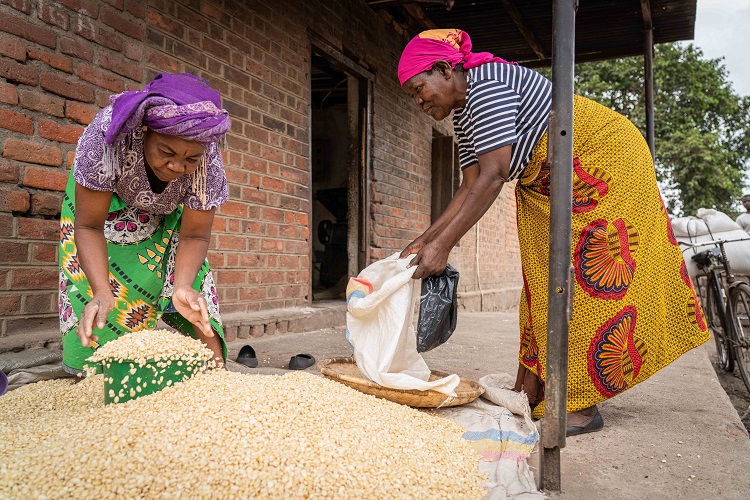
This is the largest insurance pay-out claims Malawi has ever witnessed in its 6 years of implementing crop insurance for smallholder farmers and the larger payout on the African continent to date.
WFP provides farmers with the option of crop insurance to safeguard their livelihoods in times of shock. Farmers either pay for a premium or work for 14 days (over six months during the off-season) to create assets that reduce their vulnerability to hazards over time. This (and/or a contribution in cash from participants) pays for their crop insurance coverage, which triggers a pay-out in the event of a shock. In a good season, even when no pay-out is triggered, farmers are still improving their capacity to cope with weather shocks as a result of the assets created.
In the event of a bad season (low yield) a pay-out is triggered, allowing farmers to purchase food or invest in alternative livelihoods despite the reduced harvest.
In 2021, the insurance pay-out will benefit more than 57,000 farmers across the districts of Balaka, Blantyre, Chikwawa, Machinga, Mangochi, Nsanje, Phalombe.
It will compensate farmers for yield loss of maize, beans, sorghum, rice, groundnuts, cotton and pigeon peas. Protecting farmers’ investments with insurance means that when a shock hits, compensation for losses prevents farmers from resorting to desperate measures, such as selling their livestock or taking their children out of school.
After drought and pests destroyed crops during the 2020-2021 farming season, nearly 65,000 farming households in Malawi have received cash payouts from an agricultural insurance programme of the United Nations World Food Programme (WFP).
This is one of the largest crop index insurance payouts ever on the African continent, amounting to US$2.4 million.
“Most farmers in Malawi rely on rain-fed agriculture but with the surging effects of climate change, livelihoods are cyclically disrupted, and this fuels hunger,” said Honorable Lobin C. Lowe, the Minister of Agriculture, present at the launch of the crop insurance payouts.
“Scaling up crop insurance can enhance people’s capacity to anticipate and withstand shocks and mitigate their effects in the long run.”
The Government of Malawi and a coalition of partners are empowering farming communities to manage their climate risks and reduce impacts of climate-related hazards.
In the 2020-2021 farming season, farmers insured crops such as maize, sorghum, rice, groundnuts, pigeon peas and cotton to protect their incomes from harvest losses.
Farmers accessed these policies through either paying a portion of their premium in cash or participating in building community assets such as wells, vegetable gardens and tree nurseries that help them withstand future weather shocks.
“With the changing climate, farming can be an uncertain business in Malawi, especially for smallholder farmers. The recent drought saw farmers who usually harvest up to 15 bags of 50kg of maize now harvest only one bag,” says Paul Turnbull, WFP Malawi Country Director and Representative.
“The payouts are a springboard for farmers to continue their efforts in adapting to increased weather-related shocks and fighting food insecurity and poverty.”
In recent years, Malawi has experienced a rise in the frequency, intensity and unpredictability of climate shocks, perpetuating a cycle of food and nutrition insecurity.
WFP is working with the Government and its partners to mitigate the impacts of the climate crisis for vulnerable and food insecure communities through an integrated risk management approach.
This initiative has been implemented in Malawi since 2015 and is made possible through multi-stakeholder partnerships.
WFP coordinates with technical departments from the Government of Malawi at central and district level and with the financial support of several development partners, including the Adaptation Fund, Flanders, Germany, Switzerland, United Kingdom and the United States.
As climate talks are underway at the 26th Conference of the Parties (COP26) in Glasgow, UK, WFP is advocating for better risk management systems and funding for governments to help climate change adaptation efforts.










